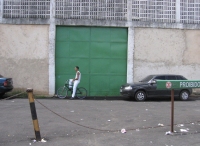 Growing up, Felipe Adão had to navigate two worlds: one as a Brazilian, the other as an Afro-Brazilian. He studied at private schools, but lived in an underprivileged area of Campinas, a city in the state of São Paulo. Both his friends from school and his friends from the street had an influence on his upbringing.
Growing up, Felipe Adão had to navigate two worlds: one as a Brazilian, the other as an Afro-Brazilian. He studied at private schools, but lived in an underprivileged area of Campinas, a city in the state of São Paulo. Both his friends from school and his friends from the street had an influence on his upbringing.
Games Without Borders
21.10.2022 | by Jessy Damba Diamba
 When history and duties to memory are ignored, truth can easily be thought of as a personal choice. Once accommodated in powerful discourse, these “truths” assume impunity: often disregarded and rarely condemned, even though they represent hate speech. Hatred has been normalized and has propelled a radicalism in which “good” struggles against “evil.” In this dichotomy, evil is once again the ‘other’. A discourse that does not humanize the ‘other’ authorizes barbarism – as we have seen in the post-election reactions
When history and duties to memory are ignored, truth can easily be thought of as a personal choice. Once accommodated in powerful discourse, these “truths” assume impunity: often disregarded and rarely condemned, even though they represent hate speech. Hatred has been normalized and has propelled a radicalism in which “good” struggles against “evil.” In this dichotomy, evil is once again the ‘other’. A discourse that does not humanize the ‘other’ authorizes barbarism – as we have seen in the post-election reactions
To read
05.11.2018 | by Fernanda Vilar
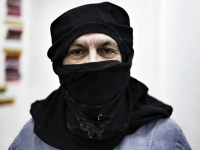 Lots of people are beginning to think about politics, learning how to think about the city, relations and institutions. There are people from all over the place, from universities, associations and schools. And the Government is feeling it, they fear our advances. But to say that popular uprisings in Brazil are brainless and devoid of focus is simplistic, because everything is focus. JEUX SANS FRONTIÈRES #2
Lots of people are beginning to think about politics, learning how to think about the city, relations and institutions. There are people from all over the place, from universities, associations and schools. And the Government is feeling it, they fear our advances. But to say that popular uprisings in Brazil are brainless and devoid of focus is simplistic, because everything is focus. JEUX SANS FRONTIÈRES #2
Games Without Borders
09.04.2016 | by
 "I don't consider Brazil that different from Angola, culturally speaking. By the way, Angola currently consumes a lot of global culture. Mostly younger people. Not even the differences in language are an obstacle to the understanding of my comics."
"I don't consider Brazil that different from Angola, culturally speaking. By the way, Angola currently consumes a lot of global culture. Mostly younger people. Not even the differences in language are an obstacle to the understanding of my comics."
Face to face
19.12.2013 | by Luís Henrique and Global Voices (Vozes Globais)
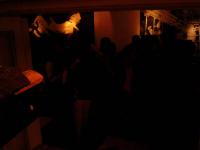 Latin American intellectuals have been in the forefront of doing mestiçage, métissage, Anthropophagy. While we certainly consider ourselves as part of Postcolonial theory, we have also critiqued certain of its aspects, for example the ahistorical, uncritical celebration of hybridity discourse. We were asking: “What are the genealogies of such discourses?” We prefer to emphasize the question of “linked analogies” between and across national borders. So for us, cross-border analysis becomes really crucial. It is not reducible to nation-state formations.
Latin American intellectuals have been in the forefront of doing mestiçage, métissage, Anthropophagy. While we certainly consider ourselves as part of Postcolonial theory, we have also critiqued certain of its aspects, for example the ahistorical, uncritical celebration of hybridity discourse. We were asking: “What are the genealogies of such discourses?” We prefer to emphasize the question of “linked analogies” between and across national borders. So for us, cross-border analysis becomes really crucial. It is not reducible to nation-state formations.
To read
01.10.2013 | by Emanuelle Santos and Patricia Schor
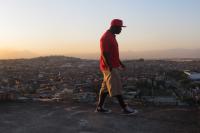 The booming economic juggernaut in Brazil has transformed lives. It has also acted as a beacon attracting migrants from all over the world, including the former Portuguese colony of Angola. Expecting to find a vast multicultural embrace, Angolan immigrant Badharo instead finds barriers and even racism in Rio. So he turns to music as a way to express his disappointment, pain and outrage.
Set against the tragic death of a young Angolan student, we experience the frustrations Badharo and his family face as their Brazilian dreams encounter a very different reality.
The booming economic juggernaut in Brazil has transformed lives. It has also acted as a beacon attracting migrants from all over the world, including the former Portuguese colony of Angola. Expecting to find a vast multicultural embrace, Angolan immigrant Badharo instead finds barriers and even racism in Rio. So he turns to music as a way to express his disappointment, pain and outrage.
Set against the tragic death of a young Angolan student, we experience the frustrations Badharo and his family face as their Brazilian dreams encounter a very different reality.
Afroscreen
06.02.2013 | by Juliana Borges and Fernanda Polacow
 The streets of Brazil are full of startling design solutions by ordinary people driven by pure human need. Adélia Borges writes about a new exhibition space that celebrates a design culture of diversity.
The streets of Brazil are full of startling design solutions by ordinary people driven by pure human need. Adélia Borges writes about a new exhibition space that celebrates a design culture of diversity.
I'll visit
28.04.2011 | by Adélia Borges
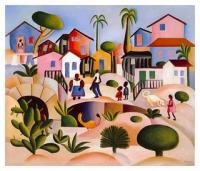 The most significant distinction in the way favela builders and architects treat space relates to temporality, since sheltering and inhabiting imply a completely different space-temporal process. It’s as if architects spatialized time, and favela builders temporalize space. This opposition becomes clear when we compare the way architects conceive space – always starting from a project, with spatial and formal projections for a near future – and the way favelas are built – where there is never a pre-established project, and the formal outline of the future construction begins to appear only when the construction process is well underway, and even then, it is never fixed or pre-defined as is the case of a traditional project.
The most significant distinction in the way favela builders and architects treat space relates to temporality, since sheltering and inhabiting imply a completely different space-temporal process. It’s as if architects spatialized time, and favela builders temporalize space. This opposition becomes clear when we compare the way architects conceive space – always starting from a project, with spatial and formal projections for a near future – and the way favelas are built – where there is never a pre-established project, and the formal outline of the future construction begins to appear only when the construction process is well underway, and even then, it is never fixed or pre-defined as is the case of a traditional project.
City
27.04.2011 | by Paola Bernstein Jacques
 I began to feel the painful lack of African history in my curriculum and the absence of Afro-Brazilians amongst my college peers. The way blacks were represented (or absent from) the media had bothered me since I was a child. Now, as a film producer, it made me even more uncomfortable. To escape this dilemma, I felt I had to follow my dream of making my own films, but where to begin?
I began to feel the painful lack of African history in my curriculum and the absence of Afro-Brazilians amongst my college peers. The way blacks were represented (or absent from) the media had bothered me since I was a child. Now, as a film producer, it made me even more uncomfortable. To escape this dilemma, I felt I had to follow my dream of making my own films, but where to begin?
Afroscreen
14.04.2010 | by Lilian Solá Santiago
 Growing up, Felipe Adão had to navigate two worlds: one as a Brazilian, the other as an Afro-Brazilian. He studied at private schools, but lived in an underprivileged area of Campinas, a city in the state of São Paulo. Both his friends from school and his friends from the street had an influence on his upbringing.
Growing up, Felipe Adão had to navigate two worlds: one as a Brazilian, the other as an Afro-Brazilian. He studied at private schools, but lived in an underprivileged area of Campinas, a city in the state of São Paulo. Both his friends from school and his friends from the street had an influence on his upbringing.  When history and duties to memory are ignored, truth can easily be thought of as a personal choice. Once accommodated in powerful discourse, these “truths” assume impunity: often disregarded and rarely condemned, even though they represent hate speech. Hatred has been normalized and has propelled a radicalism in which “good” struggles against “evil.” In this dichotomy, evil is once again the ‘other’. A discourse that does not humanize the ‘other’ authorizes barbarism – as we have seen in the post-election reactions
When history and duties to memory are ignored, truth can easily be thought of as a personal choice. Once accommodated in powerful discourse, these “truths” assume impunity: often disregarded and rarely condemned, even though they represent hate speech. Hatred has been normalized and has propelled a radicalism in which “good” struggles against “evil.” In this dichotomy, evil is once again the ‘other’. A discourse that does not humanize the ‘other’ authorizes barbarism – as we have seen in the post-election reactions  Lots of people are beginning to think about politics, learning how to think about the city, relations and institutions. There are people from all over the place, from universities, associations and schools. And the Government is feeling it, they fear our advances. But to say that popular uprisings in Brazil are brainless and devoid of focus is simplistic, because everything is focus. JEUX SANS FRONTIÈRES #2
Lots of people are beginning to think about politics, learning how to think about the city, relations and institutions. There are people from all over the place, from universities, associations and schools. And the Government is feeling it, they fear our advances. But to say that popular uprisings in Brazil are brainless and devoid of focus is simplistic, because everything is focus. JEUX SANS FRONTIÈRES #2  "I don't consider Brazil that different from Angola, culturally speaking. By the way, Angola currently consumes a lot of global culture. Mostly younger people. Not even the differences in language are an obstacle to the understanding of my comics."
"I don't consider Brazil that different from Angola, culturally speaking. By the way, Angola currently consumes a lot of global culture. Mostly younger people. Not even the differences in language are an obstacle to the understanding of my comics."  Latin American intellectuals have been in the forefront of doing mestiçage, métissage, Anthropophagy. While we certainly consider ourselves as part of Postcolonial theory, we have also critiqued certain of its aspects, for example the ahistorical, uncritical celebration of hybridity discourse. We were asking: “What are the genealogies of such discourses?” We prefer to emphasize the question of “linked analogies” between and across national borders. So for us, cross-border analysis becomes really crucial. It is not reducible to nation-state formations.
Latin American intellectuals have been in the forefront of doing mestiçage, métissage, Anthropophagy. While we certainly consider ourselves as part of Postcolonial theory, we have also critiqued certain of its aspects, for example the ahistorical, uncritical celebration of hybridity discourse. We were asking: “What are the genealogies of such discourses?” We prefer to emphasize the question of “linked analogies” between and across national borders. So for us, cross-border analysis becomes really crucial. It is not reducible to nation-state formations.  The booming economic juggernaut in Brazil has transformed lives. It has also acted as a beacon attracting migrants from all over the world, including the former Portuguese colony of Angola. Expecting to find a vast multicultural embrace, Angolan immigrant Badharo instead finds barriers and even racism in Rio. So he turns to music as a way to express his disappointment, pain and outrage.
Set against the tragic death of a young Angolan student, we experience the frustrations Badharo and his family face as their Brazilian dreams encounter a very different reality.
The booming economic juggernaut in Brazil has transformed lives. It has also acted as a beacon attracting migrants from all over the world, including the former Portuguese colony of Angola. Expecting to find a vast multicultural embrace, Angolan immigrant Badharo instead finds barriers and even racism in Rio. So he turns to music as a way to express his disappointment, pain and outrage.
Set against the tragic death of a young Angolan student, we experience the frustrations Badharo and his family face as their Brazilian dreams encounter a very different reality.  The streets of Brazil are full of startling design solutions by ordinary people driven by pure human need. Adélia Borges writes about a new exhibition space that celebrates a design culture of diversity.
The streets of Brazil are full of startling design solutions by ordinary people driven by pure human need. Adélia Borges writes about a new exhibition space that celebrates a design culture of diversity.  The most significant distinction in the way favela builders and architects treat space relates to temporality, since sheltering and inhabiting imply a completely different space-temporal process. It’s as if architects spatialized time, and favela builders temporalize space. This opposition becomes clear when we compare the way architects conceive space – always starting from a project, with spatial and formal projections for a near future – and the way favelas are built – where there is never a pre-established project, and the formal outline of the future construction begins to appear only when the construction process is well underway, and even then, it is never fixed or pre-defined as is the case of a traditional project.
The most significant distinction in the way favela builders and architects treat space relates to temporality, since sheltering and inhabiting imply a completely different space-temporal process. It’s as if architects spatialized time, and favela builders temporalize space. This opposition becomes clear when we compare the way architects conceive space – always starting from a project, with spatial and formal projections for a near future – and the way favelas are built – where there is never a pre-established project, and the formal outline of the future construction begins to appear only when the construction process is well underway, and even then, it is never fixed or pre-defined as is the case of a traditional project.  I began to feel the painful lack of African history in my curriculum and the absence of Afro-Brazilians amongst my college peers. The way blacks were represented (or absent from) the media had bothered me since I was a child. Now, as a film producer, it made me even more uncomfortable. To escape this dilemma, I felt I had to follow my dream of making my own films, but where to begin?
I began to feel the painful lack of African history in my curriculum and the absence of Afro-Brazilians amongst my college peers. The way blacks were represented (or absent from) the media had bothered me since I was a child. Now, as a film producer, it made me even more uncomfortable. To escape this dilemma, I felt I had to follow my dream of making my own films, but where to begin? 